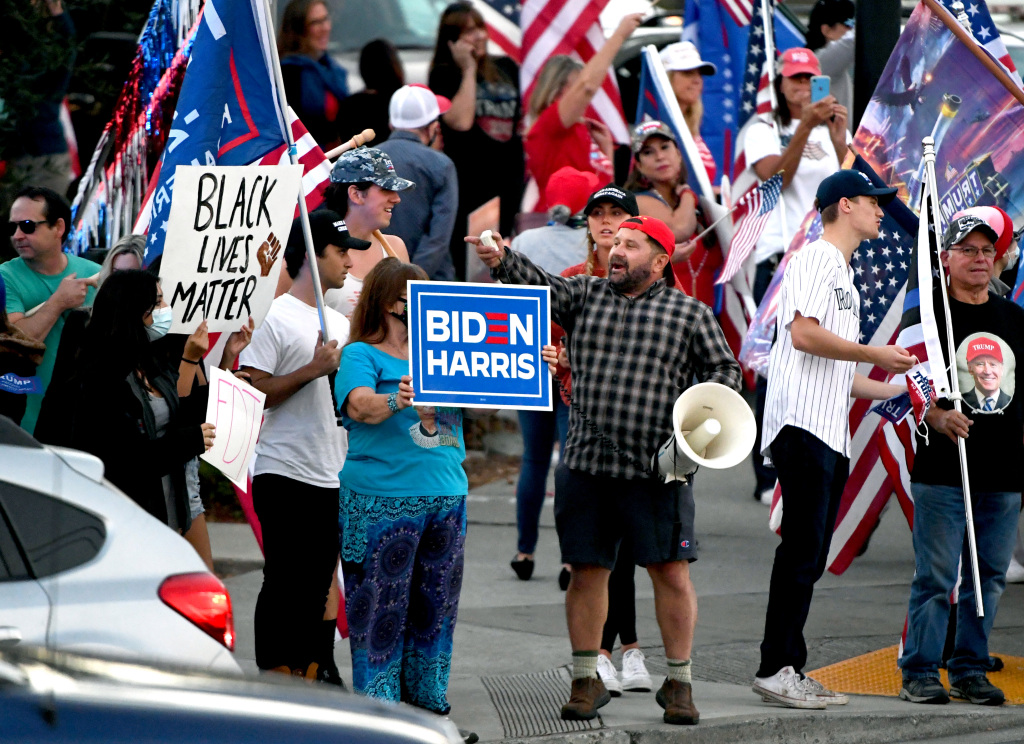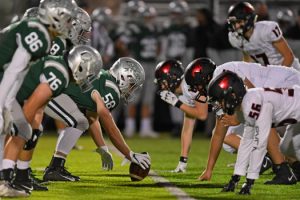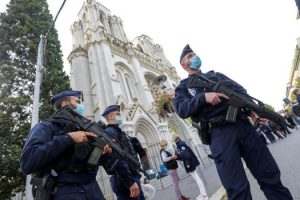Election Day will mark an end to the incessant campaign ads, phone calls and mailers, but in the politically charged Bay Area, it may kick off days — if not weeks — of protests and demonstrations.
Tuesday’s historic election will unfold against the backdrop of a global pandemic and nationwide civil unrest in response to police killings of Black men and women. In the Bay Area, where protests over the May death of George Floyd devolved into looting and police fired tear gas and injured demonstrators with rubber bullets, tensions are still running high. Now, as the election approaches, residents and law enforcement officials are prepared for people to take to the streets no matter who wins.
“If Biden wins, there’s the message: Trump, your time is up, get out of office. And Biden, we’re going to hold you accountable to the left agenda,” said Cat Brooks, an Oakland-based activist and executive director of anti-police-violence group Justice Teams Network. “And then if Trump wins, of course Oakland would be the place where we would want to have voices in the streets screaming loudly that this is not the America we’re willing to live in.”
Four years ago, thousands of protesters in the liberal Bay Area took to the streets to protest President Donald Trump’s victory.
Organizers already have several events planned this time around. In downtown Oakland, activists met Thursday to “practice” resistance in case Trump loses the election and refuses to concede — as he’s suggested in the past. They plan to rally again Nov. 4. Other rallies throughout the Bay Area are set for the coming days, including a pro-Trump car caravan Sunday in San Mateo.
But the heavy reliance on mail-in ballots this year — thanks to the COVID-19 pandemic — is likely to complicate the reaction to the election on the Bay Area’s streets. Because it will take time to count those ballots, the presidential race may not have a clear winner by Nov. 3.
As a result, the Alameda County Sheriff’s Office is preparing for the possibility that protests could last for weeks after election night, said spokesman Sgt. Ray Kelly.
“The ultimate thing we’re scared of is you would have multiple violent protests in every city throughout the Bay Area,” he said. “And that each county would be overwhelmed, and therefore there wouldn’t be enough officers to respond.”
That’s what happened in the days after Floyd’s death, he said. Alameda County wasn’t able to draw resources from other departments, and looters spent hours wreaking havoc at Powell Street Plaza in Emeryville, largely unchecked by deputies.
At the same time, law enforcement agencies are treading a fine line between being prepared and not allowing their presence to be a provocation.
In San Jose, police drew national criticism during the Floyd protests in May and June for antagonizing demonstrators and liberally deploying foam and rubber baton rounds and tear gas that injured scores of people. That prompted the department to restrict its use of the less-lethal rounds for crowd control and reconsider its visible presence at mass gatherings.
“We did learn things as a result of that protest, and we made some policy changes,” said Sgt. Christian Camarillo, a department spokesperson.
If people are peacefully protesting and no crime is occurring, officers likely will not get involved, he said. Kelly, in Alameda County, agreed. Even small-scale property crimes such as breaking glass and vandalism may go unchallenged by deputies, he said. Earlier this year, a federal judge issued an injunction limiting Oakland police officers’ use of tear gas, rubber bullets and other force during protests.
But Kiana Simmons, who founded the civil-rights group HERO Tent in part as a response to law enforcement’s handling of Floyd protests in San Jose, said she is wary of how police might approach demonstrators.
“We have to prepare for that,” Simmons said. “We have the right to be out there and protest and have our free speech.”
In Walnut Creek — where looters trashed the city’s upscale department stores in May, and police the next day made national news by siccing a dog on a 22-year-old college student — protesters’ focus has shifted to the upcoming election. And tensions are mounting.
Private security guards flanking Planned Parenthood protesters pepper-sprayed counter-demonstrators earlier this month. In a separate incident, Walnut Creek police used sponge grenades to disperse a group of 20 to 25 people who surrounded an SUV. Authorities also are investigating a swastika and the word “Trump” found painted on the garage of a home near downtown.
Walnut Creek Mayor Loella Haskew said the department learned “a lot of lessons” after criticism for its “well-intended” but “misguided” use of force against protesters on June 1.
“I think they are ready,” she said. “I think they also understand there are things that work and don’t work.”
Harmeet Dhillon, a San Francisco-based lawyer and GOP official, said she doesn’t expect Trump supporters to protest a Biden win in the Bay Area.
“It’s not our style,” she said.
California Attorney General Xavier Becerra on Thursday issued a bulletin to California law enforcement agencies outlining the laws that prohibit voter interference and intimidation.
Law enforcement agents also are watching for signs that organized, violent groups plan to visit the Bay Area around Election Day. A federal agent was murdered in Oakland in May, and two associates of the extremist, anti-government Boogaloo movement were charged in the crime.
Kelly wouldn’t say whether the sheriff’s office knows of any plans by extremist groups to meet up in the Bay Area.
But, he said, “We’re mindful and watching those individuals and working with the feds and local and state police.”



















